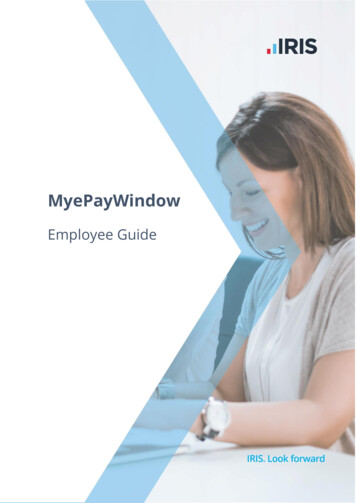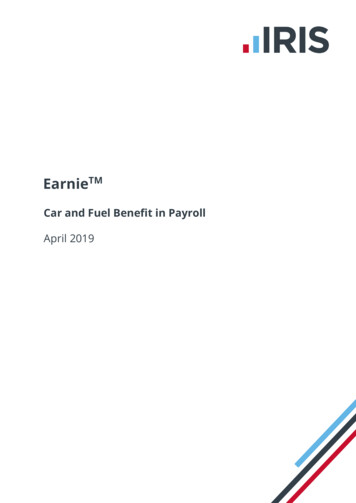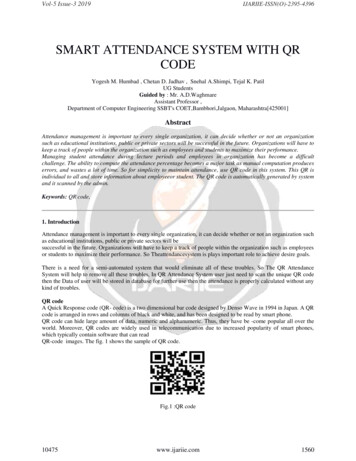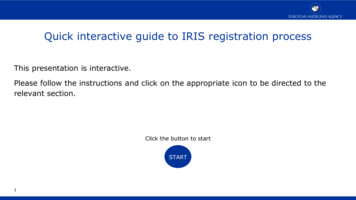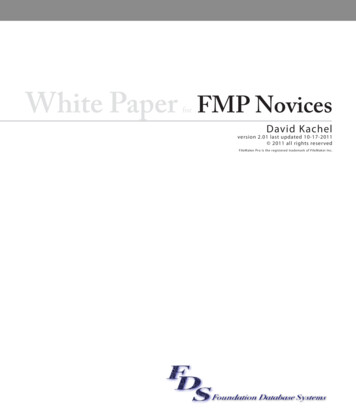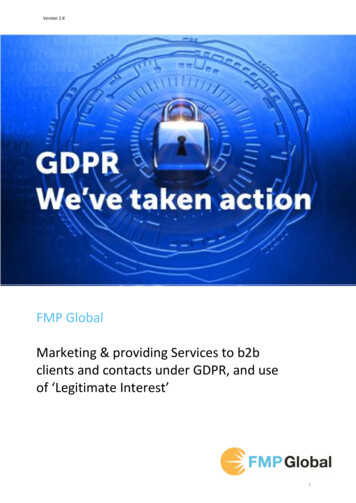
Transcription
Version 1.6FMP GlobalMarketing & providing Services to b2bclients and contacts under GDPR, and useof ‘Legitimate Interest’1
Version 1.6Contents2Introduction3BackgroundWhat is the impact of GDPR?What is Personal Data?5Lawful grounds for processing personal data6PECR and GDPRLegitimate Interest FMP Global PositionFMP Global ProcessWhat does relying on Legitimate Interestinvolve?Legitimate Interest TestLegitimate Interest Assessment (LIA)Legitimate Interest – Sample Questions14AppendicesGDPRIntroductionFMP Global and its associated subsidiaries are specialist b2b payroll and HR services andsoftware in the UK and internationally with over 40 years of experience. Marketing usesbusiness information for marketing campaigns and data management purposes. Our PayrollServices & Helpdesk, and International HR teams provide professional services. With ourdedicated team FMP Global are fully compliant with the requirements as set out in theGeneral Data Protection Regulation (“GDPR”).This document addresses the issues most frequently asked and outlines the approach that FMP Global’s marketing & servicesteams have adopted on data processing under GDPR. The following is for information and guidance only – FMP Global wouldrecommend any business also seeks independent legal advice.2
Version 1.6BackgroundThe storage and handling of data has for many years been governed by the Data ProtectionAct 1998 (“DPA”) but from May 2018 this will be replaced by the GDPR – which will providea far more robust set of rules for the collection, storage and processing of personalinformation. The GDPR is a regulation rather than a directive which means it is a single pieceof legislation that applies across all EU member states (and as the UK will still be a memberof the EU in 2018 it therefore applies to the UK in the same way). In respect of electronicmarketing communications there are additional rules that come from the Privacy andElectronic Communications Regulations 2003 (“PECR”), and with the introduction of theGDPR this is also now in the process of being revised.What is the impact of GDPR?Every organisation that holds personal data will be affected by GDPR – that includes personnelrecords, customer details, sales and marketing prospect information, online identifier dataetc. Organisations will be accountable to the data protection supervisory authorities (in theUK this is the Information Commissioner’s Office). Whilst the accountability is not a newrequirement, GDPR requires all organisations to record and document compliance with allapplicable aspects of GDPR. The Regulation gives individuals more rights in respect of theirdata, including more control and visibility of how their personal data is being used, and theright to have that information removed or moved if requested.3
Version 1.64
Version 1.6What is Personal Data?Definition of Personal Data – Article 4(1)“Personal data means any information relating to an identified or identifiable natural person (data subject); anidentifiable natural person is one who can be identified, directly or indirectly, in particular by reference to anidentifier such as a name, an identification number, location data, an online identifier or to one or more factorsspecific to the physical, physiological, genetic, mental, economic, cultural or social identity of that naturalperson.”Examples of personal data include elements such as name, address, gender, date of birth, butpersonal data can also include other less obvious identifiers such as IP addresses. Basically,personal data applies to any data from which a living individual (data subject) could beidentified.DataFMP Information Ltd62 Anchorage RoadPaul Spinks, Managing Director0121 3558600ABC tyres (Ltd or not)Nick Brown Plumbing Services(where company is unincorporated)Nick Brown Trading ABCtyres@hotmail.comI.P. addressCookie tag or logPersonal times** If they can be associated with an identifiable individual5
Version 1.6Lawful Grounds for Processing Personal DataGDPR is concerned with the collection, storage and processing of personal data – for the useof that data and in respect of electronic marketing communications there are additionalrules that come from the Privacy and Electronic Communications Regulations 2003(“PECR”), and with the introduction of the GDPR this is also now in the process of beingrevised.ExampleCollecting dataStoring data on a database or in a CRM systemProcessing data (analysing or profiling)Creating a marketing list or campaign listLoading a list into a dialler or email delivery systemSending a mailshot(for B2B)Sending an email or SMSTracking cookies or IP addressesMaking a phone ECRThere are 6 lawful grounds that can be used for theprocessing of personal data under GDPR:Processing is necessary for the performance of a contract with the data subject or to takesteps to enter into a contract.Processing is necessary for compliance with a legal obligation.Processing is necessary to protect the vital interests of a data subject or another person.Processing is necessary for the performance of a task carried out in the public interest or in theexercise of official authority vested in the controller.Necessary for the purposes of legitimate interests pursued by the controller or a third party,except where such interests are overridden by the interests, rights or freedoms of the datasubject. (Note that this condition is not available to processing carried out by publicauthorities in the performance of their tasks.)Consent of the data subject.6
Version 1.6GDPRPECR and GDPRPECR (Privacy and Electronic Communications Regulations) are the rules that relate toelectronic marketing communications such as email and SMS. These are in addition to therequirements under the GDPR. (FMP Global do not collect data for the purposes ofmarketing via SMS so the below relates only to email marketing). PECR treats the use of email for marketing communication differently depending onwhether it is sent to ‘individual subscribers’ or to ‘corporate subscribers’. ‘Individual subscribers’ include those working for unincorporated entities such as soletraders and partnerships. The rules require that electronic mail for direct marketing purposes sent to individualsubscribers must be based on a prior consent obtained from such individuals. ‘Corporate subscribers’ consist of those working for companies and other incorporatedorganisations, such as LLPs. PECR allows electronic direct marketing communications to be sent to corporatesubscribers (business email addresses of individuals working for incorporated entities)without prior consent, unless the recipient specifically requests not to receive emailsfrom the sender (“opt-out”). Each direct marketing email should include an“unsubscribe” option to allow the individual to notify the sender that he/she no longerwishes to receive emails from the sender.7
Version 1.6Legitimate Interest‘The legitimate interests of a controller, including those of a controller to which the Personal Data may bedisclosed, or of a third party, may provide a legal basis for processing, provided that the interests or thefundamental rights and freedoms of the data subject are not overriding, taking into consideration thereasonable expectations of data subjects based on their relationship with the controller The processing ofpersonal data for direct marketing purposes may be regarded as carried out for a legitimate interest.’Recital 47Recitals 47 to 50 provide examples of where a controller may have a Legitimate Interest toprocess data that would also need to be supported via a Legitimate Interest Assessment(LIA).FMP Global PositionEach legal basis for processing personal data has its own merits and needs to be consideredcarefully. There is no hierarchy, one legal basis is not ‘better’ than another, and the ICOadvises businesses to examine the most appropriate legal basis for each business.FMP Global’s view is that it is reasonable to rely on legitimate interest as grounds for theprocessing of personal data for marketing purposes, given the very limited amount ofpersonal information being processed; the fact that it is being used solely for the purposesof marketing to the business for which the individual works and not the individual him/herself; and that the individuals concerned are likely to be people within the organisationwho would expect to be contacted for business communications.In summary: Use of personal data by FMP Global is based on legitimate interest.FMP Global ProcessFMP Global seek to speak directly to businesses to establish whether our payroll and HRservices can be used. For payroll services in the UK FMPs bases legitimate interest on theneed under PAYE legislation and HMRC rules for employees to be paid, and HR services andsoftware to keep track of those employees. The same principles apply to our internationalpayroll and HR services throughout Europe and the rest of the world. If individuals object(opts-out) to FMP Global storing and using his/her personal data, then the personal data isremoved from the FMP Global database. FMP Global use the GDPR compliant Zoho CRM forstoring client data and Dotmailer as our primary email system for bulk email. Other systemsand software may support this storage.What does relying on legitimate interest involve?GDPR requires each organisation to carry out an assessment (and document it) of whichlawful grounds for processing of personal data apply to its processing activities.8
Version 1.6Relying on legitimate interest involves:Establishing the interest of the organisation – for FMP this is promoting goods orservices offered us. Processing for direct marketing purposes is specifically mentionedin the GDPR;Carrying out a necessity test – this requires consideration of whether there is anotherway of achieving the interest, without having to use the personal data. Even if thereis another way, but it would require disproportionate effort, the necessity could stillbe established. You need to consider - is there a way to make direct marketingcommunication with the correct contacts within an organisation without holdingtheir personal data? It is unlikely that there would be another proportionate way ofmaking direct marketing communications without the necessity to use personaldata; andBalancing the interest of the organisation against the fundamental rights of the datasubjects and whether the use of their personal data by the organisation could havea significant impact on their fundamental rights. In the context of b2b directmarketing, where communications relate to business services rather than thepersonal life of the individuals receiving the communications, it is unlikely that thefundamental rights of such individuals would be impaired. Those communicationsneed to be measured and unobtrusive.9
Version 1.6The Legitimate Interests TestAre you thinking of using Legitimate Interest toprocess personal data?NOYESConduct a LIA (Legitimate InterestAssessment):1. Identify the Legitimate Interests2. Necessity Test3. Balancing TestIs there an alternativelegal basis?NONONo basis toprocessYESYESWas the resultpositive?Review and documentYESDocument and includeprivacy policy statingLegitimate InterestsIf a controller wants to rely on Legitimate Interest the balance between the interests ofthe controller and the rights of the individual must be considered. To do this a LegitimateInterest Assessment (LIA) must be conducted.10
Version 1.6Legitimate Interest Assessment (LIA)This is a three-stageprocess:Identify and establish your interest Why do you want to process the data – what are you trying to achieve? Who benefits from the processing? In what way? Are there any wider public benefits to the processing? How important are those benefits? What would the impact be if you couldn’t go ahead? Would your use of the data be unethical or unlawful in any way?Carry out a necessity test. Is it a reasonable way to go about it? Is there another less intrusive way to achieve the same result?Conduct a balancing test What is the nature of your relationship with the individual? Would people expect you to use their data in this way? Can you adopt any safeguards to minimise the impact? Can you offer an opt-out?11
Version 1.6Legitimate Interest; marketing – What we’ve concludedIdentifying Legitimate InterestsQuestionWhat is the purpose forprocessing the data?AnswerCommentsTo contact UK, European andInternational businesses to advisethem of our payroll and HR services.All Limited businesses (other thansole trader/ partnerships) need away to be able to pay theiremployees. FMP provide HMRCapproved services and software tothose companies to be able tocomply with UK law.The employee processing payrollWho benefits frommay see that there is an alternativethe processing?way of processing, and identify HRtools that could help them controlemployees.It could save the company in termsWhat is the importance ofof administrative time, money, orthose benefits?the need to retain specialistknowledge. Outsourcing payroll, orthe provision of HR services, canhelp with transition of a business tothe next level in terms of strategyand tactical execution.What is the impact of not being The business we are approachingcould carry on but may ultimatelyable to proceed with thehave pressure that could impact onprocessing?staff morale, retention, compliancewith legislation and ultimately fines/business failure.What are your objectives?Necessity TestQuestionList the reasons theprocessing is important tothe data controller?AnswerCommentsEmail forms the simplest way ofcommunicating with a potentialclient.FMP marketing use data collectedfrom downloads and contact formsfrom our website ( where it isreasonable under LegitimateInterest to suggest that individualsworking on behalf of companies areinterested in our products andservices), contacts at industry eventsand seminars where they approachour staff on stand, and bought datalists from auditable suppliers ( wecurrently use a GDPR compliant 118subsidiary), existing client data.Without relevant contact data we12
Version 1.6would be unable to identify whichcontacts within a business areresponsible for HR and Payroll – akey factor of GDPR.The processing allows us to inputinto Dotmailer, an industry leadingemail management system. Thedata is checked and suppressedagainst a global suppression list andcleaned before use, maximisingopportunity to eliminate thosecontacts that have registeredagainst the CTPS database andprotecting client information.Bought data (from leading datahouse 118 group) similarly isscrutinised against CTPS and GDPRtested.Is this a reasonable way toprocess data?Is there an alternative wayto achieve the sameresults?The Dotmailer system automaticallychecks that emails are GDPRcompliant, by automaticallychecking that ‘Unsubscribe’ isrecorded on all outbound emails,and if clicked, automaticallyremoving client contact details fromthe database, ensuring the privacyof data.Yes. Email is an easy and controlledmethod of contact. Using Dotmailerwe could control how data is used,protecting b2b client information ina way that allows easy and instantability to be removed.We have investigated the situationsfully, gaining an in depthunderstanding of the legal position,and seeking guidance fromDotmailer, our email provider andour bought data providers.We could and do send mail by post,but this is more of a scatter gunapproach. We have littleunderstanding of whether theinformation sent is acceptable to ab2b client.Use of data in this way will be bothethical and lawful.Balancing TestQuestionAnswerCommentsWhat is your relationship with B2B market contacts – we seek toidentify relevant legitimate contactthe subject?primarily with ‘payroll’ ‘Finance’ or13
Version 1.6‘HR’ in their title, or in director levelpositions within smaller companieswhere it is likely that they will haveownership of the payroll function.People would expect their data tobe used in this way.At marketing stage there is noIs any of the datasensitivity. At this level we hold‘sensitive’?basic company information and thename, job title and email address.Would the data subject expect Yes.their data to be used in thisway?Might the data subject object Possibly if they are not responsiblefor HR or Payroll within theiror find the processingbusiness, but our email contains theintrusive?relevant opportunity to unsubscribe,thus mitigating any risk of intrusion.The automatic nature of theunsubscribes ensures there is nohuman element involved in theunsubscribe.What is the possible impact on Nominal.the individual?As these are to work related emailaddresses they can use appropriatesystems to unsubscribe as needed.14
Version 1.6ServicesFMP Global may provide you with a number of services, or software solutions. We may use youremployees’ data to enable us to process and pay your payrolls, to report to HMRC and pensionproviders, to advise on HR matters, and to administer employee benefits programmes as necessary.We will process the data in line with GDPR privacy and security expectations and guidelines. Therewill be a formal, contractual agreement between the Client and FMP Global which details the natureand parameters of the processing.Payroll Bureau & International Payroll and HR Processing.We will collect and process the data in line with the principles of GDPR. We act as a data processorfor payroll and HR data and will process the data to ensure compliance to statutory payrollrequirements and the data controller's specified purpose.We process the data in line with contractual requirements and obligations for all our clients.The data is collected, transmitted and processed securely, in line with our stringent ISO 27001:2013processes.We will process the data fairly and avoid over processing of the data. As an example, the list of fieldsbelow represents the data required for a successful HMRC RTI submission.Employee InformationNational Insurance numberTitleSurname or family nameForename or given nameSecond forename or given nameInitialsDate of birthGenderAddressUK postcodeForeign countryPayroll IDPayroll ID changed indicatorOld payroll ID for this employmentIrregular payment pattern indicatorPay and deductionsTaxable payTax deducted or refundedStudent Loan deductions recoveredPay after statutory deductionsDeductions from net payOn strikeNon-tax or NIC paymentStudent Loan Plan type15
Version 1.6Year to date totalsTaxable pay to dateTotal tax to dateTotal Student Loan repayment recovered to dateIf you’ve employed the same person more than once in a tax year, report fortheir current employment only.Pension deductionsEmployee pension contributions paid under ‘net pay arrangements’Employee pension contributions not paid under a ‘net pay arrangement’Employee pension contributions paid under ‘net pay arrangements’ year todateEmployee pension contributions not paid under a ‘net pay arrangement’ yearto dateStatutory maternity, paternity, adoption and shared parental payStatutory Maternity Pay (SMP) year to dateStatutory Paternity Pay (SPP) year to dateStatutory Adoption Pay (SAP) year to dateStatutory Shared Parental Pay (ShPP) year to dateShPP: Partner surname or family nameShPP: Partner forename or given nameShPP: Partner second forename or given nameShPP: Partner National Insurance numberIf you pay benefits through payrollItems subject to Class 1 National Insurance onlyBenefits this period taxed via payrollBenefits taxed via payroll year to dateEmployee pay informationEmployee tax codeEmployee tax code: Week 1/Month 1 indicatorEmployee hours normally workedPay frequencyPayment dateTax week numberTax month numberNumber of earnings periods covered by paymentBacs hash codeAggregated earnings indicatorNational InsuranceNational Insurance category letterGross earnings for NICs in this periodGross earnings for NICs year to dateEarnings at the Lower Earnings Limit (LEL) year to date16
Version 1.6Earnings above LEL up to and including the Primary Threshold (PT) year todateEarnings above the PT, up to and including the Upper Accrual Point (UAP)year to dateEarnings above the UAP, up to and including the Upper Earnings Limit (UEL)year to dateEmployee contributions payable this periodEmployee contributions payable year to dateTotal of employer’s contributions payable in this pay periodTotal of employer’s contributions payable year to dateScheme Contracted Out Number (SCON)Report this National Insurance information when you pay a director.Director’s NIC calculation methodWeek of director’s appointmentWhen an Employee JoinsStart dateStarter declarationStudent Loan indicatorAddressUK postcodeForeign countryPassport numberThird PartiesWe use robust contractual provisions to protect the storage and transfer of personal data whendealing with external and internal partners. We are updating these in line with the GDPR. FMP protectsEU personal data transferred outside of the EEA using standard contractual clause language, whereappropriate, and other EU approved mechanisms such as Privacy Shield for transfers to third partybusiness partners in the USA who have registered to that scheme.Data Retention PolicyData relating to payroll processing will be kept for a period of time. At the end of that period, you willbe contacted and given the option to either purchase additional storage or confirm the secure erasureof the data. If the data is paper based, it will be securely shredded.HR & Payroll Software – GDPR Advice to clients using our softwareWe will collect and process our client’s data in line with GDPR due to our contractual obligations toprovide software systems and support surrounding the systems. You act as the data controller andprocessor; therefore, the onus is on you, the client to ensure the necessary contracts are in place toensure your GDPR compliance.It is our clients’ responsibility to ensure the completeness, accuracy and integrity of the data. OurConsultants will setup, configure and train your users on your chosen software.We will use dummy data to train your staff, unless you request that we train you on your data. Whenwe do train you on your system, it is your responsibility to ensure that the necessary security, data17
Version 1.6segregation and privacy is in place for the users being trained.Any data sent to our Helpdesks in order to resolve an outstanding support issue will be transmittedand processed, in line with GDPR. Data will be stored securely and retained in line with our dataretention policy.Self Service PortalsWhereby a client has purchased our self-service portals, it is the client’s responsibility to ensure thatthe self-service portal is accessibly only via password for each employee. The passwords allocatedshould not be generic and each password should be unique.E-PayslipsIt is the client’s responsibility to ensure that the e-payslips are password protected. The passwordsshould not be generic, and each password should be unique.Ensuring our support teams are GDPR compliantAs part of our support investigations, in order to try and investigate / resolve an outstanding supportquery, our Helpdesks may request data backups.The backup files are transmitted and stored securely on our servers, we have taken additional securitymeasures to ensure we are fully GDPR compliant.Any data transmitted to us is held on centralised, secure servers and managed in line with our dataretention policy.Hosted System clientsOur service provider, 6 degrees, is GDPR compliant and hold a number of security ISO certifications.Further details can be found here; 18
Version 1.6FAQQ: Will FMP be sending me a new contract with GDPR language?A: We are reviewing our existing contractual relationships, and existing templates, these will beupdated and re-issued, in line with GDPR requirements. We may provide new language where wedeem it is required.Q: Can I see a copy of policies and procedures?A: Our policies and procedures at FMP Global are confidential and we do not share them withexternal parties. We do our best to provide our clients with relevant information in other ways, suchas providing this fact sheet, and educating our staff on our compliance programs.Q: Can I have more information about your information security protocols?A: We will only share limited information on our security protocols due to the importance ofmaintaining confidentiality.Q: Who do I contact for more information?A: You should contact your primary day to day contact at FMP Global if you want more informationand he or she will manage the request through our internal processesQ. Will there be a change in how data is transmitted to and from FMP Global?A: There is likely to be a change and we hope to have details of this out to all our clients as soon aspossible. We are looking at a solution with minimal disruption for all.Q: Does the Employer need to seek permission or consent from the employees to share their datawith our payroll bureau?A: No, you do not need each individual employee’s consent, as you are legally obliged to pay staff.You will, however, need to advise them that you are sharing their information with a 3rd party.19
Version 1.6Privacy PolicyThis page aims to help you understand what information we might collect about you and how weuse it.FMP Global is the Data Processor and operates through several companies within our group & withcontract third-parties, which will also be data controllers in respect of your personal data. Our groupcompanies are as follows: FMP Global (incorporating Eurowage Ltd, FMP Payroll Services Ltd, FMP HR& Payroll Software Ltd, MCN Associates Ltd) and these companies are registered with the DataProtection Register (ZA290393 / ZA290366 / Z1115288 / ZA024069), and are ISO certified(9001/27001/14001/22301)FMP Global is committed to protecting and respecting your privacy and will comply withthe applicable data protection laws in all our dealings with your personal data.We may collect and process the following data about you: Information about you, such as your name, your business telephone number andemail address Information that is provided by filling in forms on our sites. This includesinformation provided at the time of downloading gated material such as eBooks,brochures or case studies associated with HR and payroll, or completing a contactform or subscribing to newsletters; If you contact us, we may keep a record of that correspondence; We may also ask you to complete surveys that we use for research purposes,although you do not have to respond to them; Details of your visits to our site and emails received including, but not limited to,traffic data, location data, weblogs and other communication data, whether thisis required for our own billing purposes or otherwise.IP addressesWe may collect information about your computer, including where available your IPaddress, operating system and browser type, for system administration and to reportaggregate information to our partners, sponsors or advertisers. This is statistical data inaggregated form about our users’ browsing actions and patterns and will not allow ourpartners to identify you from such data.Use of CookiesWhat is a Cookie? Cookies are small, unique strings of code stored on your computer toimprove your use of our sites and to help us to improve functionality and security of thesites. We use both session and persistent cookies; session cookies expire when you close thebrowser and persistent cookies remain on your computer until you remove them. Wemay also use cookies to automatically collect information from your computer when youvisit our sites, and automatically store it in the log files. This may include information ontype of browser software, website activity and your IP address.Cookies enable us to:Estimate our audience size and usage pattern20
Version 1.6Allow us to customise our site according to your individual interestsSpeed up your searchesAllow you to more easily find previously viewed contentYou can refuse to accept all or some cookies by modifying settings within your browser (for guidanceon how to do this visit http://www.aboutcookies.org/). However, if you blockthe session cookies you may be unable to access certain parts of our sites.Where we store your personal dataThe data that we collect from you may be transferred to, and stored at, a destinationoutside the United Kingdom and the European Economic Area (“EEA”). It may also beprocessed by staff operating outside the UK or the EEA who work for us or for one of oursuppliers. We will take all steps reasonably necessary to ensure that any personal datatransferred outside the UK or the EEA is treated securely and in accordance with theapplicable data protection laws.We will store all information about you on secure servers. Where we have given you (orwhere you have chosen) a password which enables you to access certain parts of our site,you are responsible for keeping this password confidential. We ask you not to share apassword with anyone.Unfortunately, the transmission of information via the internet is not completely secure.Although we will do our best to protect your personal data, we cannot guarantee thesecurity of your data transmitted to our site. Each business unit has conducted its ownsecurity reviews in relation to data transmission and has adjusted its processesaccordingly. Once we have received your information, we will use strict procedures andsecurity features to try to prevent unauthorised access.Legal basis to process your personal dataUnder the applicable data protection laws, we need a lawful basis to collect and use yourpersonal data. The law allows for six lawful bases to process people’s personal data, andone of them allows personal data to be
Storing data on a database or in a CRM system GDPR Processing data (analysing or profiling) GDPR Creating a marketing list or campaign list GDPR Loading a list into a dialler or email delivery system GDPR Sending a mailshot None (for B2B) Sending an email or SMS PECR Tracking cookies or IP addresses PECR Making a phone call PECR PECR
